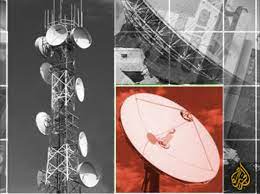Maat supports the Emirati approach to rejecting the document restricting Arab satellite channels.
And it demands the Arab League to protect its research centers
Maat Center is following up on the meetings of the Permanent Committee for Arab Media of the League of Arab States, to discuss some items related to the implementation of the decision of the Council of Arab Information Ministers on how to implement the document organizing satellite broadcasting, which was approved in the extraordinary meeting of ministers last February.
According to what was published by the newspapers, the committee received 6 working papers, whose countries refer to its observations on the document, which Qatar has renewed its reservations on, but new reservations by the United Arab Emirates have drawn attention in a way that confirms the growth of an Arab trend against some of the restrictions stated by it on satellite channels in media areas. The free one with privacy and the duty to work away from the legal frameworks similar to the idea of the document, and the UAE believes that what is contained in it is an explicit violation of what is in force for it and is difficult to implement.
The Center supports the Emirati trend towards rejecting the document upon its release, or rather the bad intentions it bears towards the free Arab media, after undermining and nationalizing the Arab media and adapting them for the benefit of the governments and systems of the countries of the region, so it is not permissible for these governments to take free ideas and applications in various fields such as economy, trade and industry. And it monopolizes control over the media and the tools of private capital in its industry ...
The center states that the Arab League, whose media committee is discussing how to set up a legal framework for blocking satellite channels outside the text, is the one that kept silent about the cessation of the activities of the Zayed Center for Coordination and Follow-up, its most prominent study centers, and the Arab human rights and research circles paid a heavy price for his absence after a Western campaign accused him of anti-Semitism. Despite being the most important center concerned with the Palestinian cause - about 67 studies were published - with his publications greatly contributing to spreading the culture and concepts of community peace, and no one has moved a finger towards his return since August 2003, and perhaps the time has come to invite Sheikh Khalifa bin Zayed, the ruler of the Emirates, to resume his activities related to the issues. Nationalism and contemporary Arabism.
Maat believes that the document of Arab media ministers, which is expected to be passed after discussions within the corridors of the Arab League, will cause heavy losses to the Arab economy after the escape or prevention of private channels from broadcasting on Arab satellites, and the Arab regimes ignore that the media has become the second important industry and trade for the Arab world after arms. And political dealings that do not take into account the economic and social dimension are not suitable with them, because these channels have a role in increasing Arab awareness of the issues of the region, and the technology revolution and information circulation impose a new necessity for dealing with the media, the provisions of the document do not agree with it, because it violates the articles of the International Covenant on Economic, Social and Cultural Rights The center calls on the Arab League to protect its research centers instead of formulating legal frameworks that undermine what remains of media resistance defending peoples' rights to knowledge and confronting the robbing of their heritage and history.
shortlink: https://maatpeace.org/en/?p=32857












